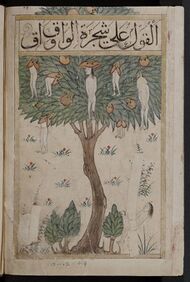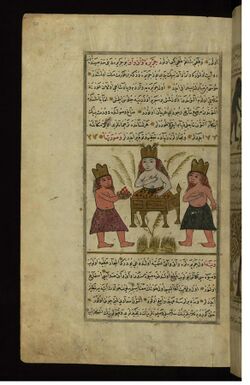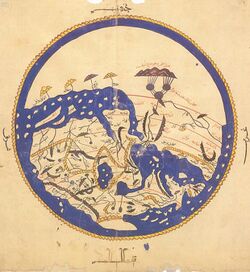Earth:Wāḳwāḳ
Wāḳwāḳ (Wāḳ Wāḳ, Wāḳ al-Wāḳ, al-Wāḳwāḳ; Arabic: الواق واق Script error: The function "transl" does not exist.) is the name of an island, or possibly more than one island, in medieval Arabic geographical and imaginative literature.[1]
Ibn Khordadbeh mentions Waqwaq twice: "East of China are the lands of Waqwaq, which are so rich in gold that the inhabitants make the chains for their dogs and the collars for their monkeys of this metal. They manufacture tunics woven with gold. Excellent ebony wood is found there. And again: Gold and ebony are exported from Waqwaq."[2] Michael Jan de Goeje offered an etymology that interpreted it as a rendering of a Cantonese name for Japan . Gabriel Ferrand identified it with Madagascar , Sumatra or Indonesia.[2]
Wāḳwāḳ is referred to in a number of sources, it is generally an island far away.
The waqwaq tree
T’ung-tien by Ta Huan mentions an Arab account of a tree growing little children. In later Arab versions, the tree is named waqwaq. An Andalusi versions mentions beautiful women as the fruit of the tree.[2]
See also
- Zaqqum, a tree in Jahannam, the fruits of which are shaped like the heads of devils.
- Jinmenju, a strange Chinese tree in Toriyama Sekien's Konjaku Hyakki Shūi.
- Nariphon, a tree in Buddhist mythology which bears fruit in the shape of young female creatures.
References
- ↑ G. R. Tibbetts; Shawkat M. Toorawa; G. Ferrand; G.S.P. Freeman-Grenville (22 August 2013). "Wāḳwāḳ". in P. Bearman, Th. Bianquis, C.E. Bosworth, E. van Donzel, W.P. Heinrichs. Wāḳwāḳ (Second ed.). Brill Online. http://referenceworks.brillonline.com/entries/encyclopaedia-of-islam-2/wakwak-COM_1334.
- ↑ 2.0 2.1 2.2 Saudi Aramco World: The Seas of Sindbad, Paul Lunde.




